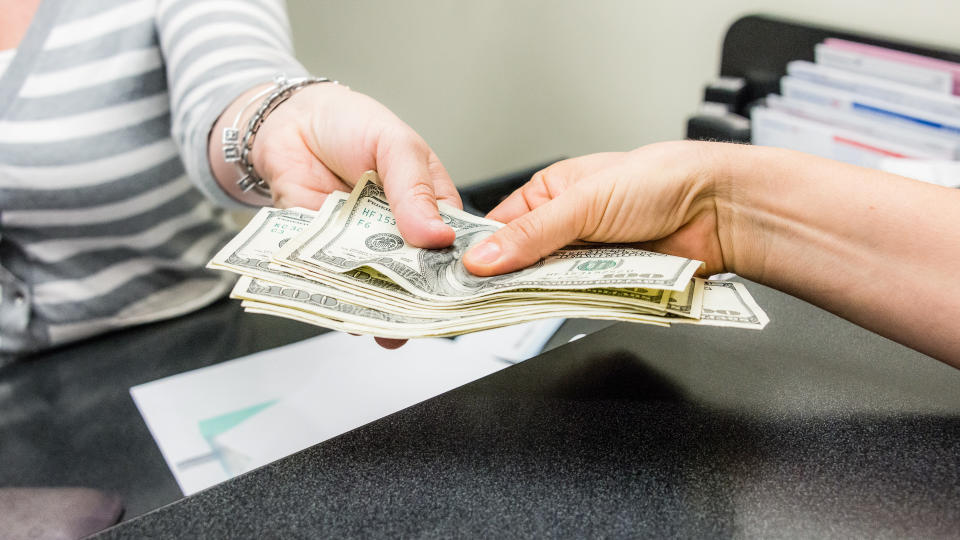I’m a Bank Teller: 4 Reasons You Should Withdraw Your Savings Right Now

Roughly 95% of Americans have either a checking or savings account, according to the Federal Deposit Insurance Corporation (FDIC). For many people, a savings account is a great place to keep extra money for a major life event, like a wedding or home purchase, or emergencies.
Savings accounts are generally FDIC-insured up to $250,000, meaning your money is protected against bank failure. The funds are also still accessible but separate enough from your checking account to where you’re less likely to use them for everyday expenses.
Find Out: How Much Does the Average Middle-Class Person Have in Savings?
Read Next: 4 Genius Things All Wealthy People Do With Their Money
Still, as useful as savings accounts can be, there is a right time to withdraw the funds. If you’re thinking about withdrawing the money from your savings account, here’s when you should do it — and when you shouldn’t.
You Need Extra Cash To Cover Something Planned
“Typically, the biggest reasons people withdraw their savings are to cover a bill, to make a purchase, home repairs, for vacations or for birthdays and holidays such as Christmas,” said Arielle Torres, an assistant branch manager at Addition Financial Credit Union.
These are all sound reasons to withdraw the funds.
Say you’ve been saving up for a down payment and are ready to close on your new home — that’s a good time to draw from your savings. Upcoming trips and major home repairs, ideally those that are planned out, are also valid reasons.
You might also want to withdraw from your savings account to cover debts, especially high-interest ones that are draining your monthly cash flow. If possible, wait until you have an emergency fund. Then, once you have the funds available, pull from your savings to pay off that debt.
See More: I’m a Frugal Shopper: 4 Items I Always Buy Secondhand To Save Money
You’re Dealing With an Emergency
One of the clearest signs that you should withdraw from your savings account is in the event of unavoidable emergencies, said Torres. Common emergencies include surprise medical bills, a broken down car, necessary home repairs and layoffs at work — basically, anything that wasn’t planned and can’t be covered with your regular income or budget.
Ideally, you’ll have a separate emergency fund for this and won’t have to touch your regular savings account. But if you don’t and you need the money, your savings account is a good alternative. It’s also a better option by far than having to turn to high-interest credit cards or loans to cover the emergency expense.
You’re Ready To Invest
You might also want to withdraw from your savings account if you’re ready to invest, said Torres. How much money you take out depends on the investment and your goals. The type of investment account also depends on your situation and how soon you expect to need access to the money.
If, for example, you know you won’t need the money for at least a year, you could move it into a certificate of deposit (CD). This is a separate account that usually comes with a higher interest rate than most savings accounts. The tradeoff is that you won’t be able to access the money in the CD until it matures — that is, its term ends. If you do, you could face a hefty fee.
If you won’t need the money for at least several years or a decade, you could instead invest your savings in an IRA, brokerage account or index funds. Investing your money does come with some inherent risks, but you could see significant gains over time. You’ll generally need to leave the money untouched for a long time, but it can grow more quickly than it would in a savings account.
Inflation Is Eating Away at Your Funds
According to the FDIC, the average savings account has an annual percentage yield (APY) of just 0.45%. High-yield accounts have a much higher yield at up to 6.08%.
According to the Bureau of Labor Statistics, the average rate of inflation from April 2023 to April 2024 was 3.4%. If you’ve been keeping your money in a savings account with a lower yield than the rate of inflation, you should switch over to a higher-yield account.
There’s a Wrong Time To Withdraw Your Savings, Too
While there are several reasons why you should withdraw from your savings, there are also a few why you shouldn’t.
“Some signs that it is not a good idea to withdraw your savings is withdrawing due to uncertainties as a result of the economy or to make an impulse purchase,” said Torres.
You should also avoid withdrawing too often or too much all at once. While you have every right to your own money, some banks and credit unions have daily or monthly withdrawal limits on savings accounts. If you exceed these limits, you could be charged a fee.
Withdrawing too much or without cause could also make it harder to build up your savings or achieve other short- and long-term goals — like buying a house, paying for a vacation or having enough money to cover emergencies.
More From GOBankingRates
This article originally appeared on GOBankingRates.com: I’m a Bank Teller: 4 Reasons You Should Withdraw Your Savings Right Now

 Yahoo Finance
Yahoo Finance 